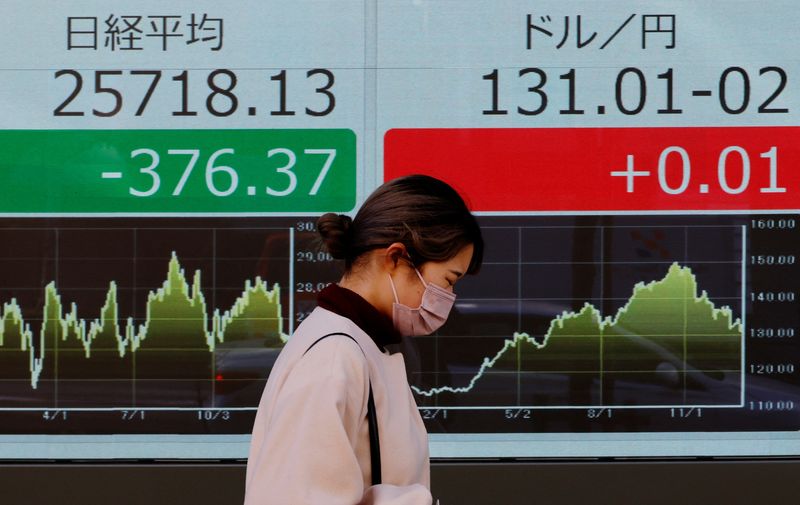By Herbert Lash
NEW YORK (Reuters) - Global stocks skidded and the dollar jumped on Tuesday after Moody's (NYSE:MCO) cut the credit ratings of 10 small- to mid-sized U.S. banks and China's trade data was worse than forecast in July, raising concerns about the global economic outlook.
The yuan slid to a three-week low as Asian stocks and the Australian and New Zealand dollars, seen as proxies for Chinese growth, turned weaker. The data heightened pressure for China to provide fresh stimulus to prop up demand.
Moody's also placed six banking giants, including Bank of New York Mellon (NYSE:BK), US Bancorp (NYSE:USB), State Street (NYSE:STT) and Truist Financial (NYSE:TFC), on review for potential downgrades in a move that tempered a still strong outlook for U.S. growth.
Longer term, an issue is unlikely, but rising interest rates and regional banks' exposure to commercial real estate has cast a cloud over the market, said Anthony Saglimbene, chief market strategist at Ameriprise Financial (NYSE:AMP) in Troy, Michigan.
"Investors are using some of this news to trim positions that have done very well," he said. "Markets are just going through a period where investors are questioning whether stock prices have run ahead of some of the fundamentals."
In another potential banking woe, credit card delinquencies rose to a 11-year high in the second quarter as measured on a four-quarter average as Americans borrowed more than ever, the New York Federal Reserve Bank said in its quarterly household debt and credit report.
When student loan repayments resume Oct. 1, discretionary spending will get cut, perhaps considerably, said Troy Ludtka, senior U.S. economist at SMBC Nikko Securities Americas in New York.
"Americans are going to struggle to pay back auto loans, credit cards and increasingly mortgages, as a result," he said.
MSCI's U.S.-centric gauge of global stock performance closed down 0.6%. The pan-European STOXX 600 index fell 0.23%, with losses limited by drugmaker Novo Nordisk (NYSE:NVO)'s shares rising 17.3% to a record high after a study showed its obesity treatment has a cardiovascular benefit.
Italy sent shockwaves across the European banking sector by setting a one-off 40% tax on Italian bank profits reaped from higher rates, after reprimanding lenders for failing to reward depositors.
The euro zone bank index fell 3.54% to post its biggest single-day decline since the financial turmoil of March.
After a five-month rally which pushed both the benchmark S&P 500 and the Nasdaq Composite within 5% of their lifetime highs, August has now recorded five losing sessions out of six.
The benchmark S&P 500 and the Nasdaq Composite have notched five losing sessions out of six in August, after a five-month rally had pushed both indices within 5% of their all-time highs.
The Dow Jones Industrial Average fell 0.45%, the S&P 500 lost 0.42% and the Nasdaq Composite dropped 0.79%.
The S&P 500 is trading around 18.5 times next year's earnings, and "if we avoid a recession and analysts are right, then the stock market is more fairly valued," Saglimbene said.
But earnings growth is again negative for the second quarter and is expected to be flat for the third quarter, making valuations for this year a little bit stretched, he said.
The dollar index, a measure of the U.S. currency against six peers, rose 0.45% after the disappointing Chinese trade figures led investors to shift to safer assets.
News that Country Garden, China's biggest privately owned property developer, had not paid two dollar bond coupons due on Aug. 6, added to signs of severe stress in the property sector.
The euro fell 0.43% to $1.0955.
U.S. and European bond yields fell, reversing some of the increases seen over the last week.
The two-year Treasury yield, which typically reflects interest rate expectations, unchanged at 4.758%, while the yield on 10-year notes fell 5.4 basis points to 4.024%.
Oil prices edged higher as the U.S. Energy Information Administration projected GDP growth to rise by 1.9% in 2023, up from a prior 1.5% forecast. But bearish data on China's crude imports and exports offset optimism over the report. [EIA/M][O/R]
U.S. crude futures rose 98 cents to settle at $82.92 a barrel, while Brent settled up 83 cents at $86.17.
Gold prices fell to a near one-month low as investors took refuge in the dollar after the weak China trade data, while caution prevailed ahead of U.S. inflation figures on Thursday.
The Consumer Price Index (CPI) will be a key input into the Fed's next interest rate decision in September.
U.S. gold futures settled 0.5% lower at $1,959.90 an ounce.
